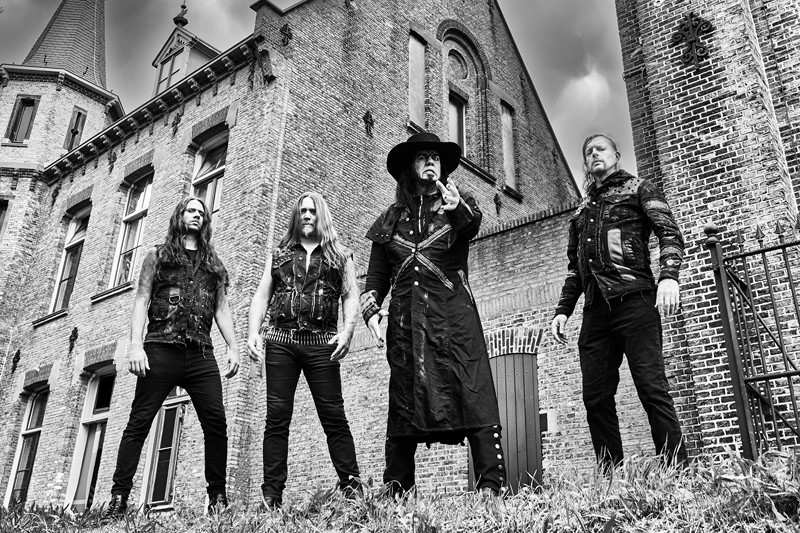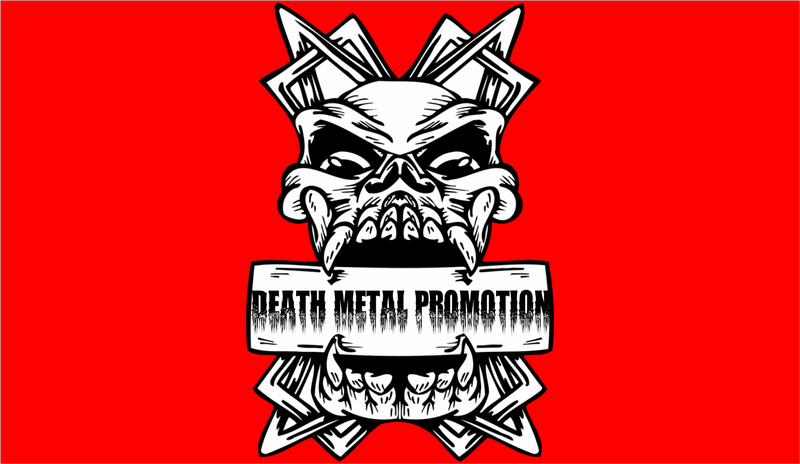
Hi! What inspired the themes of strength and honor in EPIC?
Hi. Well, first off I’d like to address the fact that all lyrics and themes related to the lyrics are written and imagined by David, so my perception and understanding might differ from his. But, to start somewhat vaguely, I believe that our common and longstanding contributions to the extreme metal scene speaks for itself. I mean, all 3 of us, the core, has been active since the mid to late 80s, doing our stuff, so there’s a lot of battles fought over that period of time, if you get my point. We´re still here, and this album shows, in my opinion, that we are still relevant. We still have something to say and we´re still hungry for more. We´re “lifers” in this sense, so the sum of it all falls quite naturally into the album title I’d say. Another thing that can be mentioned is that everything feels and sounds pretty much the same these days, like it comes from a conveyor belt, all standardized and lacking in authority. IMO, there are few bands who stand tall, refusing to obey the rules, refusing to compromise. We are one of those bands, keep doing our thing without a concern what impact it may create. Those bands, or individuals are the EPIC’s in my opinion.
Can you explain the collaborative songwriting process for EPIC?
Pretty much the same as the last time. It’s a really, dare I say “simple” way of approaching this. It’s basically just to meet up, and enjoy each other’s company and then start to jam. It’s the synergy, the free flowing energy between the 3 of us that makes it Vltimas. To be a bit more specific; it all starts with me having a riff, a riff that might have been recorded at my home studio or a riff I come up with on the spot. First case scenario; I send the riff over email and ask for inputs. If everyone is happy with the direction of the riff, then we´ll add it to a folder, a folder where we gather all the promising ideas. Then once we meet up, we go through the folder, have a few beers and try to expand on the most interesting ones. It’s a simple setup as well, with a laptop, electronic drums and a small Marshall amp, all to get the right, calm environment. Personally, I don’t like to create this type of extreme music with full-on volume and acoustic drums, and an amp on 11, it’s simply too noisy for me. I can’t focus like that. So yeah, an appropriate volume so I can hear myself think is crucial. From there on, just riding the vibes…
How did you balance the direct and progressive elements in EPIC’s songs?
By not overthinking every step of the way. Letting that “it must be overly elaborated and thought through ” obsessiveness go, I guess. I’ve been known for overthinking before, but ironically enough, it’s the opposite of the music I usually listen to, for the most part anyways. OK, so I enjoy a lot of 70s prog but I also like a lot of straightforward music. Classic rock etc. So, I feel that this was something that was bound to happen this time, letting the more direct, almost primal aspect be the predominant one. IMO the first record was at times over the top in terms of progressiveness, and I do feel we toned that aspect way down this time around. That’s not to say it’s not coming back btw, it’s just a vibe that we felt to be more representative for the band at this point in time.
Why was recording EPIC together in one physical space important to the band?
Well, we didn’t exactly do it like that. Sure, we all recorded our parts in the same studio (Arda Recorders, Porto) but guitars and bass were recorded separately from the drums etc, and obviously the vocals were done after the guitars were done, so it wasn’t a “live recording” per se if that’s what you mean. That’s what we do during writing sessions only.
I guess the only thing that was done “live” together, was that I tracked my guide guitar alongside Flo´s drum takes from start to finish, I mean, instead of having the guitars pre-recorded to a click. I believe this aspect of the recording made the songs more natural, as we were always paying attention to each other during the drum tracking. Sometimes a look can indicate a slight improvisation etc, and that’s what I refer to as the X-factor in music. And possibly one of the most important things about an album. Let yourself go with the flow until it’s fully recorded. With everything set in stone before you actually record it, things can tend to be a bit …square? I guess what I am trying to express is the importance of having an open mind all the way until things are actually tracked, done and dealt with. Well, at the end of the day, it’s all about personal preference.
What role did producer Jaime Gomez Arellano play in shaping EPIC’s sonic identity?
Jaime Gomez Arellano did an amazing job supervising the whole process, and was very instrumental in setting up the sounds etc. Bass and drum sound wouldn’t have been the same without him surely, although I must add that David has an impeccable ear for these aspects as well.
Further, I’d say that all the post effects and levels etc were perfectly treated by Gomez. He is a wizard at what he does, and I guess that is the reason he is once again working with us. He simply knows what we want and we´re all on the same page.
What’s the symbolism behind EPIC’s album cover?
The eagle was made for us as a shirt design before we embarked on our first run across Europe back in 2019 actually. It was done by an Italian designer called Daniele Valeriani, and symbolizes the 3 headed “beast” we are, or at least were at the time. With the core members being the 3 of us. Now it has changed slightly, as Ype is added as a permanent member but at the time of recording SWMI, it was just the 3 of us. The eagle is an old symbol and can be seen in the context, symbolically with freedom, strength, royalty and also courage. It is indeed a powerful symbol and we feel it to be a perfect symbol of our combined journey.
How did you craft the lyrics for EPIC, particularly using double entendre and metaphor?
You will have to ask the wordsmith himself about this. We all have our distinct delegations in this band, mine is the musically creative part.
What were the main challenges during EPIC’s recording process?
Time. Time flies so fast when you are in the studio, it’s unbelievable. I actually had to record some additional guitars in a local studio here in Almada, Portugal, where I currently reside. There were a few things lacking on Miserere and another song, so I simply had to take some extra time off to do the stuff here. You know, it’s hard to control this aspect of the recording process. I mean, you come in and plan to do the drums in 4 days and then the guitars in 10, with all the overdubs, solos, rhythms etc, but then suddenly you wake up one day and it’s on day 8 and you´re still lacking 2 songs for the drums, as an example. So yeah, stuff kinda gets shuffled around all the time. We booked a month this time, next time it will surely be 6 weeks, just to make sure that everything is done by the time we exit those studio doors. This being said, everything turned out the way we wanted in the end, and the sound and vibe of the album is fantastic. So are the fan reactions, so we couldn’t be happier.
What sets tracks like “Miserere,” “Mephisto Manifesto,” “Scorcher,” and “Invictus” apart?
I find those 4 songs to sum up the band in the year of 2024. 4 slightly different songs, with a slightly different focus and aim, but all combined they sum up Vltimas 2024, I’d say. So, what sets them apart is what binds them, and us, together.
How did you decide on the track sequencing for EPIC?
Easy. By just listening to the songs in a row and putting them in an order that sounds both interesting and also meaningful from a textual point of view, as well as from a musical point of view. I guess you can say it’s almost like telling a story. A story has, usually at least, a beginning and an end, so listening to the record from start to finish should give this sensation.
Can you share any memorable moments from EPIC’s recording sessions?
There weren’t many memorable moments, I’m afraid. Every day consisted of waking up and walking for 25-30 minutes to the studio on the opposite side of town, work our asses off, go for lunch, work some more, then head on back to our apartment we had rented and get semi-drunk and then repeat the next day. It’s more of a mental thing than anything else, being in the studio. It’s all about finding the right pieces to the puzzle. The actual playing is not so hard, well, unless the song is called “Scorcher” that is. That song is quite fast, besides it has a very peculiar picking pattern on the speed riff, so yeah, that was a physical exercise. But again, no funny stories. Just work, walks and a slight excess of alcohol.
What production aspects contributed to EPIC’s intense sonic expression?
It’s a bit like food: high quality ingredients equals better tasting food. The better the wine, the better the bordelaise etc. We used high end amps, a great drum kit etc etc. Then the challenge is to get this aspect captured the best possible way. Again, the better starting point, the better the outcome.
How does the partnership with Season of Mist contribute to EPIC’s goals?
Oh, I’ve been with Season Of Mist for over 25 years at this point. They’ve always been very supportive and loyal, and a good partner to be backed by. I feel that they have been doing a tremendous job so far on the press side of things, so I am very optimistic about results etc for this album. I guess this one is also a slightly easier sell as it is our 2nd album, and this time we’re not a totally unknown entity seemingly coming out of nowhere.
What do you hope listeners will take away from EPIC? Thank you for your time!
Inspiration. That’s what I would love to get back from an album, any album I listen to. And I do, sometimes.
If you really would like to support Antichrist, you can just Share our article.
You can also support Antichrist by sending a couple bucks to cover some webhosting expenses. =>> PayPal




